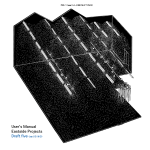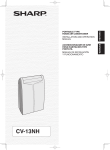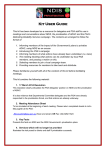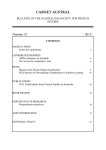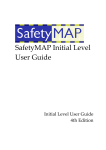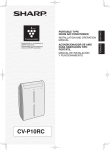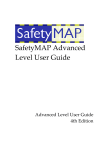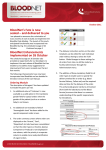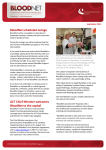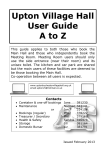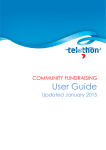Download Kit User Guide
Transcript
Kit User Guide This kit has been developed as a resource for delegates and PSA staff to use in meetings and conversations about NDIS, the privatisation of ADHC and the PSA’s Defending Disability Services campaign. The contents are arranged to follow the format of: 1. Informing members of the impact of the Government’s plans to privatise ADHC, using NDIS as an excuse. 2. Introducing the PSA’s campaign. 3. Informing members of what actions have already been undertaken (i.e. bans) 4. The meeting deciding what actions can be undertaken by local PSA members, and passing a motion on this. 5. Selecting members to join a local campaign team. 6. Providing resources for members to take back and distribute. Please familiarise yourself with all of the contents of this kit before facilitating meetings. This kit contains the following material: 1. 17 March 2014 Resolution This resolution clearly articulates the PSA delegates’ position on NDIS and the privatisation of ADHC. It is also evidence that Departmental Committee delegates and the PSA have already responded to the privatisation threat, and that actions are already underway. 2. Meeting Attendance Sheet To be circulated at the beginning of each meeting. Please return completed sheets to John McLoughlin at the PSA: [email protected] (Scan and email ) OR Fax: (02) 9262 1623 3. Key Facts Presents the facts on NDIS and the NSW Government’s privatisation plans. 4. Services which will no longer be provided Illustrates the risk posed to clients and staff if privatisation succeeds. 5. Important Dates This information illustrates and should be used to emphasise that a roadmap exists for the full privatisation of ADHC, and that every ADHC employee is at risk. 6. Campaign Outline - “The PSA is running a campaign to stop the privatisation of ADHC” This document introduces the PSA’s campaign, the campaign’s objective and how it will work. 7. Key Messages This contains the four themes that must be emphasised throughout contact with members, carers and the public. 8. Work Bans Bulletins – Hunter, Illawarra and Client Map and Master Roster Building Tool These bulletins illustrate how the resolution has been implemented in local areas and across the state. They should also be used to start the discussion on what actions will work in the local area, which will lead to a motion for local actions. Other outcomes of this conversation will include the selection of members to join a local campaign team, who will lead the campaign on a local level and undertake client and stakeholder mapping. 9. Response to Michael Coutts-Trotter Shows ADHCs comment on member’s actions, and our response to this. This should be used as a guide for dealing with objections to our campaign. 10. Frequently Asked Questions Covers key questions about NDIS, privatisation and the PSA’s campaign, and will also be available for members online. 11. Letter to Parents, Carers and/or Guardian For distributing to carers and parents by attaching to correspondence, or sending/giving directly to individuals. 12. We Care sheet To be distributed to members to place on noticeboards, use for desk drops, etc. 13. Large Defending Disability Services poster (folded separately in bags) To be distributed to members to place on noticeboards etc. For electronic copies of this material please go to http://psa.asn.au/defending-disability-services/ Authorised by Anne Gardiner, General Secretary, Public Service Association of NSW 17 March 2014 Resolution of PSA Delegates This meeting of state wide Disability Services Delegates vehemently opposes the privatisation of Ageing, Disabilities and Home Care (ADHC) Services and as a result have lost confidence in the Minister, John Ajaka. We condemn the NSW Government for using the National Disability Insurance Scheme (NDIS) to disguise its privatisation agenda. The NDIS was introduced to improve choice, funding and quality of services available to people with disability. We support the principles of this important reform, and improved funding and services for all people with a disability. However, there is no direct connection between the NDIS and the NSW Government's ideological decision to privatise all publicly delivered disability and home care services in our state which the Government is driving via the NDIS Enabling Act. This meeting recognises the real distress the Government's decision has caused families who rely on publicly run disability and home care services. There is also real distress amongst workers whose employment security, workplace rights and conditions of employment are being sacrificed in the race to privatise. This meeting of state wide delegates endorses an industrial ban to be placed on the work related to the privatisation of ADHC to be implemented immediately and to run until the NSW Government abandons the privatisation of disability services. Unanimously Endorsed Authorised by Anne Gardiner, General Secretary, Public Service Association of NSW Privatisation of ADHC Meetings Attendance sheet Date: Time: First Name Venue: Last Name Mobile Email Address (If no mobile, contact number) (If no email then street address OR FAX) Are you: ADHC staff/ or Parent/Client/ Community member Can you help with our campaign? Yes/No Services that will no longer be provided by ADHC if the privatisation IS IMPLEMENTED Services for people with disability and aged care: Early intervention programs for children and young people; Supported accommodation in the community and specialist centres; Supporting people to live independently in the community; Programs that develop independent living skills; Helping people with a disability become active in their communities through social groups, work and other activities; Advocacy and information; Case management and access to therapy services including occupational therapy, speech pathology and physiotherapy. Services for carers: Respite and support for carers; Training for parents of children with an intellectual disability; Help in managing challenging behaviour; Support groups and networks. Authorised by Anne Gardiner, General Secretary, Public Service Association of NSW Key Facts Following commencement of the full NDIS scheme from July 2018, the NSW Government will not provide any disability services or basic community care services. There are 13 823 employees in ADHC, 10516 permanent, 987 temporary, & 2320 casual. The NSW Government and ADHC have so far failed to provide a commitment to protect services or jobs for people affected. ADHC is the largest single provider of disability services in NSW making up 40% of the sector. The Government’s Home Care Service is the largest provider of home based care in NSW, having provided this support for almost 70 years. ADHC provides disability and home care services to around 90,000 clients, including the bulk of specialist, high-needs services. The Home Care Service provides subsidised home and community care to people with disability, older people and their carers to live independently in their own homes. Aboriginal Home Care Services Branches provide a wide variety of services specifically for Aboriginal and Torres Strait Islander clients. The major component of home based care (70%) is to people over 65. The current COAG funding contract for over 65s ceases in June 2015. The actual contract ceases in September 2015. Respite Centres are under review and may no longer provide a service. Authorised by Anne Gardiner, General Secretary, Public Service Association of NSW Important dates in the lead up to the privatisation of ADHC 2012 December Heads of Agreement finalised between the Commonwealth and NSW Governments for the National Disability Insurance Scheme (NDIS) 2013 July NDIS in NSW launched in the Hunter region 2013 November NDIS Enabling Act is passed 2014 May Public Service Agencies “Transaction Unit” may be submitting their “Divestment Strategy” to the NSW Government. 2014 May Possible changes to Federal Funding for NDIS scheme THE FOLLOWING DATES MAY BE IMPACTED BY THE TRANSACTION UNIT’S SUBMISSION TO CABINET AND FEDERAL DECISIONS. 2015 September Current COAG funding agreement for Aged Care expires 2016 July Transition to the full scheme will begin 2017 July Ministerial Council will set out terms of reference for a Productivity Commission to review scheme costs prior to commencement of full scheme 2017 July Funding mechanism to be determined and agreed 2017 December Productivity Commission report to be issued. The report will include sustainability of scheme costs and impact on ‘mainstream services’ 2018 July 1 Full privatisation to be implemented in NSW and the Government will not provide any residual specialist disability services or basic community care services Authorised by Anne Gardiner, General Secretary, Public Service Association of NSW The PSA is running a campaign to stop the privatisation of ADHC This campaign is being run in order to: Ensure that service recipients can continue to choose ADHC as their provider of choice Ensure that the new NDIS money is spent on building capacity in the disability sector, and not wasted on transferring what exists in ADHC to a less regulated and less experienced sector Protect job security, pay, conditions and entitlements for our members To achieve this, the PSA will run a campaign which: Establishes a high profile & media focused coalition of stakeholders to protect disability services Sets up networks between PSA members, their local communities, local MPs and media Raises the profile of the PSA within ADHC Provides members with the opportunity to increase their involvement with the PSA and every non-member with the opportunity to join Builds the number of union contacts and strengthens union structures across ADHC Engages and trains delegates and activists on the development and implementation of their campaign Improves the PSA’s communication with members including the opportunity for two way communication Authorised by Anne Gardiner, General Secretary, Public Service Association of NSW Key Messages – 4 Themes THEME 1: National Disability Insurance Scheme is being used as a Trojan Horse to privatise public disability and homecare services in NSW. THEME 2: Privatisation will undermine the positive benefits of NDIS. NDIS is a positive initiative which provides sorely needed additional funds and choice to people with disability and is meant to increase the number of jobs in the industry. NDIS is meant to provide choice, but privatisation removes the provider of choice for 40 per cent of the sector. The PSA fears that the new funds available through the NDIS will be wasted in recreating infrastructure that currently exists. New money available from NDIS should be spent on building on what is already there, not tearing down existing services and trying to recreate them. Clients and their families will be forced to contend with changes in providers and carers, as well as potential relocations and a sector that is not equipped with the experience and infrastructure needed. Services to regional areas will be diminished or lost where there is insufficient demand for an NGO to set up. Our members tell us that NGOs are less likely to accept certain clients, for example those with high or complex needs. This begs the question: What will happen to the clients that the private providers won’t work with once the army of experienced staff that currently exists in ADHC are no longer there? Improving care for people with disabilities must be the primary aim of the set-up of the NDIS not the pursuit of an ideological agenda for small government. There is no commitment that the 25000 new jobs that the NSW Government claims will come from NDIS will be in addition to the 14,000 being lost from ADHC, and no commitment that they will be ongoing, full time jobs. Page | 1 Theme 3: Privatisation means removing the NSW Government as the single largest provider from the sector. This will lead to: losing economies of scale in (ie value for money) achieved through having one large provider in the mix of choices available to clients; losing the provider and employer of choice from the sector (ie 40% of services currently provided by NSW Government), denying clients the option of remaining with their current provider of choice, losing the current leader in the provision of disability services in NSW. the loss of Government as a safety net delivering services to o those clients in areas where it is not economically viable for private providers to set up a service and o those clients that have high and/or complex needs, including those clients that the NGO sector not accept. Theme 4: Privatisation of disability and homecare services is risky and unplanned Privatisation should not occur unless and until the Government is certain that the jobs and capacity exist to improve the care for clients. Casualisation of the sector is a very real risk if privatisation proceeds. Consequences of casualization include: destabilising the relationship between carer and client; loss of experienced staff deterioration of employment conditions and rights Exploitation of clients is a risk if clients are not given the right support such as advocacy support, to make the choices they are being asked to make. Wasted money and opportunity is a risk as 25,000 new jobs in the sector may not eventuate if the government does not build the capacity of the NGO sector before transferring any assets or services to the NGO sector. There are too many unanswered questions for all involved in disability and homecare services, including clients and staff alike Authorised by Anne Gardiner, General Secretary, Public Service Association of NSW Page | 2 National Disability Insurance Scheme March 2014 DC Motion Endorsing Bans PSA Work Bans Hunter At a meeting of members in the Hunter a motion was passed to enact work bans. These bans show the determination of the members to fight to save their job security, pay and conditions and the services they deliver. Specific bans for the Hunter District: Ban on direct contact/communication with or from the NDIA staff. Stopping the provision of NDIA related information to ADHC management or the NDIA. Not attending ADHC NDIA/NDIS internal meetings. Not attending planning meetings. Not forwarding on NDIA correspondence. To get involved in the campaign to protect disability services contact your PSA delegates and JOIN us today! You can also JOIN the PSA online at www.psa.asn.au Authorised by Anne Gardiner, General Secretary, Public Service Association of NSW, 160 Clarence St Sydney 2000 This meeting of state wide Disability Services Delegates vehemently opposes the privatisation of Ageing, Disability and Home Care (ADHC) Services and as a result have lost confidence in the Minister, John Ajaka. We condemn the NSW Government for using the National Disability insurance scheme (NDIS) to disguise its privatisation agenda. The NDIS was introduced to improve choice, funding and quality of services available to people. However, there is no direct connection between the NDIS and the NSW Government ideological decision to privatise all publicly delivered disability and home care services in our stat which the Government is driving via the NDIS Enabling Act. This meeting recognises the real distress the Government’s decision has caused families who rely on publicly run disability and home care services. There is also real distress amongst workers whose employment security, workplace rights and conditions of employment are being sacrificed in the race to privatise. This meeting of state wide delegates endorses an industrial ban to be placed on the work related to the privatisation of ADHC to be implemented immediately and to run until the NSW Government abandons the privatisation of disability services. National Disability Insurance Scheme April 2014 DC Motion Endorsing Bans PSA Work Bans Illawarra/Shoalhaven At a meeting of members in the Illawarra a motion was passed to enact work bans on Home Administrative reporting to the agency. These bans show the determination of the members to fight to save their job security, pay and conditions and the services they deliver. Specific bans for the Illawarra/Shoalhaven District Work bans on group home administrative reporting to the Agency including: Completion of vehicle running sheets; Financial audits including finmart and; Reporting returns; Populating spreadsheets or tables relating to group home data. Tasks specifically excluded from work bans are: Completing purchase card verifications; and Petty cash and petty cash reconciliations. To get involved in the campaign to protect disability services contact your PSA delegates and JOIN us today! You can also JOIN the PSA online at www.psa.asn.au Authorised by Anne Gardiner, General Secretary Public Service Association of NSW, 160 Clarence St Sydney 2000 This meeting of state wide Disability Services Delegates vehemently opposes the privatisation of Ageing, Disability and Home Care (ADHC) Services and as a result have lost confidence in the Minister, John Ajaka. We condemn the NSW Government for using the National Disability insurance scheme (NDIS) to disguise its privatisation agenda. The NDIS was introduced to improve choice, funding and quality of services available to people. However, there is no direct connection between the NDIS and the NSW Government ideological decision to privatise all publicly delivered disability and home care services in our state which the Government is driving via the NDIS Enabling Act. This meeting recognises the real distress the Government’s decision has caused families who rely on publicly run disability and home care services. There is also real distress amongst workers whose employment security, workplace rights and conditions of employment are being sacrificed in the race to privatise. This meeting of state wide delegates endorses an industrial ban to be placed on the work related to the privatisation of ADHC to be implemented immediately and to run until the NSW Government abandons the privatisation of disability services. National Disability Insurance Scheme April 2014 DC Motion Endorsing Bans PSA Work Bans The new Client Map and Master Roster Building Tool At their 17 March meeting, the ADHC Departmental Committee (DC) placed bans on work related to the privatisation of ADHC. Following the release of the new client map and Master Roster Building tool, a special DC meeting was held. This meeting endorsed that the new client map and master roster building tool is a part of these bans. As such, all members are directed to ban all work on completing and providing the new client map and master roster building tool to management. This direction will not affect your pay as the master rosters are submitted to workforce management and your pays are based on your master rosters. The full motion is as follows: “This special meeting of the ADHC DC resolves that a direction be issued to members placing an urgent ban on completing and providing to management the new client map and master roster building tool.” To get involved in the campaign to protect disability services contact your PSA delegates and JOIN us today! You can also JOIN the PSA online at www.psa.asn.au Authorised by Anne Gardiner, General Secretary Public Service Association of NSW, 160 Clarence St Sydney 2000 This meeting of state wide Disability Services Delegates vehemently opposes the privatisation of Ageing, Disability and Home Care (ADHC) Services and as a result have lost confidence in the Minister, John Ajaka. We condemn the NSW Government for using the National Disability insurance scheme (NDIS) to disguise its privatisation agenda. The NDIS was introduced to improve choice, funding and quality of services available to people. However, there is no direct connection between the NDIS and the NSW Government ideological decision to privatise all publicly delivered disability and home care services in our state which the Government is driving via the NDIS Enabling Act. This meeting recognises the real distress the Government’s decision has caused families who rely on publicly run disability and home care services. There is also real distress amongst workers whose employment security, workplace rights and conditions of employment are being sacrificed in the race to privatise. This meeting of state wide delegates endorses an industrial ban to be placed on the work related to the privatisation of ADHC to be implemented immediately and to run until the NSW Government abandons the privatisation of disability services. Many of you have seen Michael Coutts-Trotter’s response to the work bans which were recently voted on by delegates. In the event that these objections are raised by members, team leaders or managers during your ADHC meetings, we have prepared the following responses for you. Michael Coutts Trotter’s original email is below in black and our response is immediately following in maroon. Dear Colleagues, I’ve heard reports that the Public Service Association has directed union members working for ADHC in the Hunter to ban work which requires cooperation with the National Disability Insurance Agency (NDIA). This is the Commonwealth agency responsible for working with people with disability in the Hunter trial site to give them access to fully funded lifetime care and support arrangements. THE PSA has reluctantly introduced bans to oppose the privatisation of ADHC disability services and to pressure FACS into respecting the rights of employees. The bans are carefully selected to ensure that they do not impact on clients or their carers. There are also reports that the PSA has extended the ban to work across NSW that relates to the movement of ADHC disability services to the NGO sector as part of the NDIS transition. All members across NSW will have the opportunity to vote on bans particular to each region. The PSA supports this because we oppose the privatisation of ADHC, and the failure to protect member’s jobs, conditions and pay. If this ban is formalised and people act on it, consider what it would actually look like. An NDIS planner comes to the group home to discuss how a person with disability wants to live their life and what NDIS-funded supports they’ll need to do it. A staff member turns the planner away at the door. NDIS planners should not visit a group home without being invited by a resident or their family. If a planner has been invited then obviously the planner is welcome to meet with the resident and their family. However, under the ban in place in the Hunter, PSA members will not participate in this meeting. Page | 1 A letter from the NDIA arrives at a group home addressed to a person with disability who lives there. A staff member locks the letter away in the office so it can’t reach its intended recipient. This is not designed to impact clients, rather the administration. PSA members are urged to attach the PSA statement which explains the union’s position on NDIS and Privatisation and the concerns we have with the Government’s intention to privatise. I’m not being provocative. These are the practical implications of the work ban as the PSA has explained it to us. We’re told the work ban was triggered in part by the NDIA asking some of our ADHC colleagues to do things that hadn’t been agreed to. Fair enough to raise a concern, but a work ban isn’t a right or proportionate response. If people think they’re being asked to do more than they should, it’s the job of FACS senior officers to work with the NDIA to sort it out. The PSA has repeatedly sought resolution of these issues. We have met with FACS and Treasury representatives and the Minister. However, Government has not committed to an agreement to protect members conditions or entitlements or job security. Therefore, issues such as superannuation, leave entitlements and continuity of service, as well as support for staff during the transition, remain up in the air. It is only with enormous disappointment and frustration at the progress of these discussions that the delegates and members voted to take industrial action. This sort of stuff is easily resolved through normal and professional dialogue between our agencies. This should have been resolved before the implementation of the NDIS began in the Hunter. The PSA is regularly meeting with FACS, yet they have failed to address our issues, including a commitment to ongoing working conditions. The PSA has not formally advised us of the work ban. We’ll consider its full implications if and when we have that advice. The Minister is aware of the bans as per his recent comments in Parliament and the PSA has formally advised ADHC of the work bans. Page | 2 If you’re thinking about following the work ban, I urge you to think carefully about the implications for people you support, for yourselves and for your colleagues. The PSA does not enter into bans lightly, and when we do so we ensure that our action does not disadvantage clients. But if the privatisation succeeds, especially in its current form, ADHC employees and clients will be heavily disadvantaged. Existing ADHC clients will be impacted as their provider of choice (ADHC) is dismantled and denied to them. Carers are approaching the PSA asking that we work together against the changes being implemented by the Government. As it stands right now ADHC staff can be forcibly transferred to a private provider on lower pay and conditions with no right to redundancy. If you believe that NDIS should improve choice and quality of service for clients, and if you believe that NDIS was not intended to deny employees their rights and conditions, then the ban should be followed. A work ban won’t change the government’s decision to withdraw from direct delivery of disability services delivery and re-auspice our services in the NGO sector. This paragraph of the DGs email is concerning as it highlights that the NSW Government does not have an open mind during discussion. It is unfortunate to see that the government won’t enter into discussion or consider alternative viewpoints in making their decisions. It is also disappointing that tricky language is getting used to hide what is really happening. By “re-auspice”, the State Government and ADHC are saying privatise, not just to the NGO sector but to other types of organisations also, including “for profit” organisations. But it will make it harder for people with disability who we support to get into the NDIS. This is incorrect. 70% of ADHC group home clients already have NDIS plans actioned as a result of the NDIA working with the NGOs. We are aware that ADHC has already provided to NDIA all of their clients contact and family details. Page | 3 And any ban will look passing strange to the many people – in NGOs and the community – who look to our committed disability staff to model leadership and professionalism in a time of sweeping change in the whole disability sector. This statement in the email begs the question of who it is that the Director General and the Government thinks the disability sector will look to for model leadership and professionalism once the Government has totally dismantled ADHC with privatisation? As the model of leadership and professionalism, ADHC should remain a choice for people with a disability under NDIS. On another note, you may have also seen media coverage today of the capability review of the NDIA. The NSW Government is confident in the process and progress we’re making towards an NDIS. We don’t anticipate any delays for access to the NDIS by people with disability across NSW because of the Commonwealth Government’s administration. The PSA is a strong supporter of the NDIS and recognises the unmet need in the community for increased funding and choice of services for many people with disability who currently receive minimal or no services. We urge FACS and the Government to focus their efforts on building service capacity in the sector, rather than wasting time and money on transferring what already exists to the private sector. Consider the words of the NDIA chairman Bruce Bonyhady who commissioned the review. He said it had made the organisation “stronger for knowing our weaknesses…”. He said “I think that every nation-building reform is hugely complex, hugely challenging and has enormous time pressures, and this is no different. We have all those things and what the board wanted was a realistic assessment of where we are today and what we have to do in order to ensure we deliver the scheme sustainably.” Quotes can be used to support or argue for any case and previously the NDIA Chairman said that “families will be better off when NSW jettisons its long term care responsibilities” (meaning privatisation). The Government has presented no evidence to demonstrate that privatisation is necessary for the NDIS to succeed or that it will lead to better outcomes for clients. In fact, the PSA is concerned that no attention has been paid to the amount of money that will be wasted on transferring ADHC to the private sector instead of being spent on building upon what already works. Authorised by Anne Gardiner, General Secretary, Public Service Association of NSW Page | 4 Frequently asked questions on the PSA, NDIS and privatisation…. Does the PSA support the NDIS? YES! The PSA supports the NDIS and the injection of funds this should lead to for disability care in NSW. What the PSA does not support is the privatisation of Ageing Disability and Homecare (ADHC). And that is exactly what is happening with the NSW Government using the NDIS as a vehicle by which to totally privatise Disability Support, Home Care and Aged Care services including public group homes. How will the NDIS be funded? States, Territories and the Commonwealth will continue to provide existing funding. The Medicare Levy is due to rise from 1.5% to 2% on 1 July 2014 and this money will be placed in a separate fund to meet additional NDIS costs. What is the NSW Liberal Government doing to disability care in NSW? As it stands anyone currently accepted into the care of ADHC has a promise of care for life. This is not only fair and proper but also provides peace of mind to parents/carers/guardians, particularly as they get older. These expectations are about to be dashed in a most cruel way. The fact is the NSW Government is using the NDIS to change the rules for, and in the process change the lives of, people with disabilities in NSW. Historically, non-government organisations (NGOs) have regularly referred clients back to ADHC when they exhibit challenging behaviour, as only ADHC staff have the skills, knowledge and systems to provide the necessary care. But with the Government washing its hands of disability care and ADHC, who will care for these clients when the NGOs decide it’s all too hard? What are the bans that the PSA have introduced? PSA delegates who work across ADHC in direct support of people with disability met recently and endorsed bans on providing assistance in the transitioning of ADHC clients to the private system. Until we receive assurances about life long care and services levels for clients as well as workplace conditions and job security for the staff involved, we will not support the roll out of the NDIS, worthy as the original intended principle of the scheme undoubtedly is. Page | 1 The PSA is currently developing a schedule of meetings across the state to ensure that members have the opportunity to vote on implementing bans and other action in their district. What’s so wrong with privatisation? Privatising disability support and homecare services will reduce choice and lead to an end of certainty for clients and a poorer level of care for people with disability who need accommodation and respite services. Clients and their families will be forced to contend with changes in providers and carers, as well as potential relocations from their homes. PSA members are committed to enhancing the quality of life for people with disability, it is why they have chosen to work in this field, and they are now facing a sweeping change that will impact on their rights as workers and on the rights and quality of life of the clients they have worked closely with. Privatisation will also mean that sorely needed funds for the state disability sector will instead be wasted on transferring assets to the private sector and retraining new workers - in an attempt to replicate the services of ADHC - rather than build on the existing structures and services. The O’Farrell Government claims that privatisation will increase choice. Isn’t that a good thing? Privatisation will actually undermine choice and the positive benefits of the NDIS. ADHC is the largest single provider of disability and homecare services in NSW. While NDIS is being marketed as a means to increase choice, the NSW Government’s privatisation will remove the choice of this public provider. Additionally, existing clients will be denied the choice of staying with their current provider. The Government has not explained what will happen where a private provider is not available in, for example, regional areas or when a private provider no longer wants to work with a client, or won’t accept individuals with high and complex needs. This means that not only will privatisation reduce choice; it leaves NSW with no safety net for people with disability who are unable to find suitable care. Wasn’t the privatisation of disability and homecare services a requirement of receiving NDIS funding from the Federal Government? No. Other states such as South Australia will continue to provide publically owned disability and homecare support services. NSW will not and this was a decision of the NSW Government in order to expand their ideological agenda of privatising public services, be it vocational education and training (TAFE), electricity or water. Page | 2 Won’t this model of the NDIS deliver 25,000 new jobs? This is what the Government claims, however, so far, there is no evidence that this will be the case. In fact, the PSA’s major concern is that the Government will simply use the additional NDIS money to transfer the existing 14,000 permanent, properly paid jobs, with decent working conditions to the private sector to create a part time and casual workforce with inferior working conditions. What are NGOs? NGOs, or Non-Government Organisations, have traditionally been not for profit entities that provide disability services in addition to the publically owned provider. The privatisation of disability services in NSW means that the sector will be open to takeover by huge multi-billion dollar companies whose primary interest is profits for their directors and shareholders, not the provision of high quality care to the most vulnerable. What does the National Disability Insurance Scheme (NSW Enabling) Act mean for Home Care and disability workers? The Act allows for the forced transfer of ADHC staff to non-NSW Government employers, including NGOs and profit driven providers. Staff have no entitlement to transfer compensation, and while the Act allows the Minister to enter into ‘transfer agreements’ with new providers, the scope of these agreements is limited and employee redundancy entitlements may be lost on transfer. The long service leave entitlements of employees may also be cashed-out on transfer at the discretion of the Minister. Despite numerous meetings, FACS and Treasury representatives have so far failed to make any commitments to protect conditions or entitlements or job security for ADHC employees. Therefore, issues such as superannuation, leave entitlements and continuity of service, remain at risk. What is happening to the current publically owned disability services assets? The NDIS (NSW Enabling) Act allows for the transfer of publically owned assets to non-government organisations, including profit driven providers. The Act also allows for the provision of financial assistance to the non-government sector in relation to the transfer of these assets. In effect, the Government is not only giving away publically owned assets, but paying organisations to take them! How can I learn more? To get involved in the campaign then either email [email protected] or visit psa.asn.au Authorised by Anne Gardiner, General Secretary, Public Service Association of NSW Page | 3 We Care We all want the quality disability and homecare the NDIS can provide. But the NSW Government is using the NDIS as an excuse to privatise disability and homecare services at a high cost to choice, standards of care and jobs. There is no evidence that shows that privatisation of disability support, homecare and aged care services will lead to increased choice or improved range or quality of services. In fact, the loss of publically provided services means a loss of services to clients where it is not economically viable for private providers to set up a service as well as to those clients with high and complex needs. The privatisation of disability and homecare services will mean the loss of the largest and most experienced provider from the sector. The sorely needed funds promised via the NDIS will be wasted on dismantling ADHC and trying to recreate it in the private sector. This is why PSA members say NDIS – YES! PRIVATISATION – NO! To support the PSA’s campaign, go to www.psa.asn.au or email [email protected] Authorised by Anne Gardiner, General Secretary, Public Service Association of NSW























